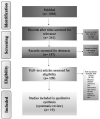How are Medical Institutions Supporting the Well-being of Undergraduate Students? A Scoping Review
- PMID: 36268575
- PMCID: PMC9590426
- DOI: 10.1080/10872981.2022.2133986
How are Medical Institutions Supporting the Well-being of Undergraduate Students? A Scoping Review
Abstract
Introduction: Medical students experience significant stress and impacts on mood due to multiple factors. Unmitigated stress impacts both physical and mental health while increasing the risk of unethical behavior. It is important for medical institutions to identify strategies that effectively reduce perceived stress and improve the well-being of their students.
Methods: The authors undertook a scoping review of the literature to identify strategies implemented by medical educational programs to improve the well-being of medical students.
Results: Of 1068 articles identified, 19 studies met the inclusion criteria. Interventions were categorized as mindfulness-based programs, reflection groups, curriculum changes, and 'miscellaneous.' All studies assessed outcomes of student stress/resilience, as well as additional domains including academic performance, mental health, and interpersonal skills. Some also assessed the acceptability of the intervention to students.
Conclusions: Despite the heterogeneity of interventions and outcome measures, a clear theme emerged that institutionally-provided strategies to promote student well-being tend to be effective when students opt into the program. It was noted that adding mandatory content or activities to a medical program without creating adequate space or support for it can have the opposite effect. Further high quality intervention studies involving randomization, blinding and rigorous controls are warranted.
Keywords: Burnout; medical education; medical institution; medical students; resilience; stress; well-being; wellness strategies.
Conflict of interest statement
No potential conflict of interest was reported by the author(s).
Figures



Similar articles
-
Evaluation of a Novel Wellness Curriculum on Medical Student Wellbeing and Engagement Demonstrates a Need for Student-Driven Wellness Programming.Teach Learn Med. 2023 Jan-Mar;35(1):52-64. doi: 10.1080/10401334.2021.2004415. Epub 2022 Feb 2. Teach Learn Med. 2023. PMID: 35107397
-
Recovery schools for improving behavioral and academic outcomes among students in recovery from substance use disorders: a systematic review.Campbell Syst Rev. 2018 Oct 4;14(1):1-86. doi: 10.4073/csr.2018.9. eCollection 2018. Campbell Syst Rev. 2018. PMID: 37131375 Free PMC article.
-
Exploring conceptual and theoretical frameworks for nurse practitioner education: a scoping review protocol.JBI Database System Rev Implement Rep. 2015 Oct;13(10):146-55. doi: 10.11124/jbisrir-2015-2150. JBI Database System Rev Implement Rep. 2015. PMID: 26571290
-
Scoping Review of Programmatic Well-Being Interventions and Outcomes to Support Pharmacy Students.Am J Pharm Educ. 2024 Feb;88(2):100638. doi: 10.1016/j.ajpe.2023.100638. Epub 2023 Dec 22. Am J Pharm Educ. 2024. PMID: 38141955
-
[Which interventions improve the well-being of medical students? A review of the literature].Encephale. 2020 Feb;46(1):55-64. doi: 10.1016/j.encep.2019.09.004. Epub 2019 Nov 22. Encephale. 2020. PMID: 31767254 Review. French.
Cited by
-
Differential Sources of Distress in Clinical and Research Trainees: A Focus on Work and Role Relationships.Mayo Clin Proc Innov Qual Outcomes. 2025 Mar 19;9(2):100601. doi: 10.1016/j.mayocpiqo.2025.100601. eCollection 2025 Apr. Mayo Clin Proc Innov Qual Outcomes. 2025. PMID: 40206641 Free PMC article.
-
Stress and coping skills in medical students.Korean J Med Educ. 2025 Mar;37(1):59-63. doi: 10.3946/kjme.2025.323. Epub 2025 Feb 26. Korean J Med Educ. 2025. PMID: 40049683 Free PMC article.
-
Exploring the association between mindfulness and imposter syndrome in medical students: a cross-sectional study.BMC Med Educ. 2025 Aug 23;25(1):1191. doi: 10.1186/s12909-025-07773-9. BMC Med Educ. 2025. PMID: 40849462 Free PMC article.
-
Enhancing self-care education amongst medical students: a systematic scoping review.BMC Med Educ. 2024 Jan 8;24(1):37. doi: 10.1186/s12909-023-04965-z. BMC Med Educ. 2024. PMID: 38191374 Free PMC article.
-
The effect of sociodemographic characteristics, academic factors, and individual health behaviors on psychological well-being among college students.J Am Coll Health. 2024 Jun 7:1-11. doi: 10.1080/07448481.2024.2355160. Online ahead of print. J Am Coll Health. 2024. PMID: 38848275
References
-
- Nechita F, Nechita D, Pîrlog MC, et al. Stress in medical students. Rom J Morphol Embryol. 2014;55(3 Suppl):1263–1266. - PubMed
-
- Zoccolillo M, Murphy GE, Wetzel RD. Depression among medical students. J Affect Disord. 1986;11(1):91–96. - PubMed
-
- Dyrbye LN, Thomas MR, Shanafelt TD. Medical student distress: causes, consequences, and proposed solutions. Mayo Clin Proc. 2005;80(12):1613–1622. - PubMed
-
- Dyrbye L, Shanafelt T. A narrative review on burnout experienced by medical students and residents. Med Educ. 2016;50(1):132–149. - PubMed
Publication types
MeSH terms
LinkOut - more resources
Full Text Sources
Miscellaneous
